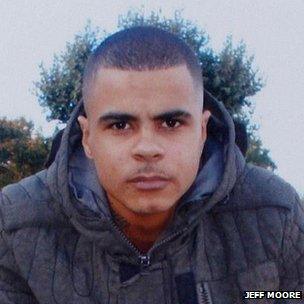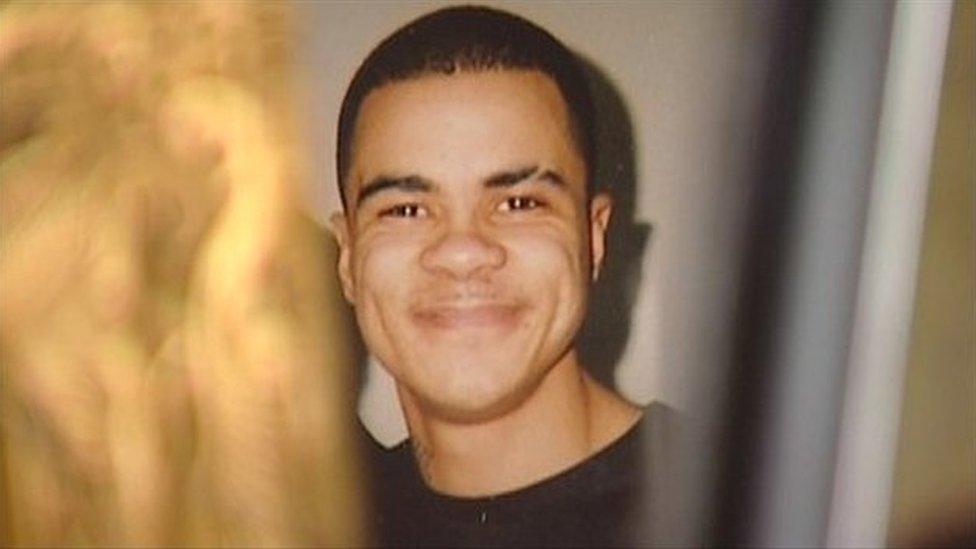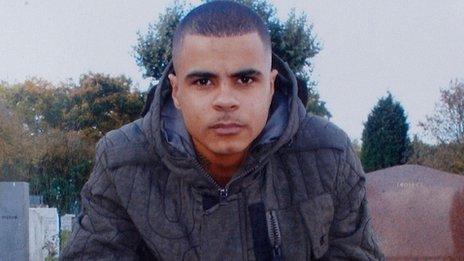IPCC seeks increased powers to investigate police
- Published

Mark Duggan was shot dead by police in Tottenham last year
The police watchdog for England and Wales is calling for new powers to make officers attend interviews if they witness a fatal shooting by colleagues.
The demand comes as the BBC has learned that the Independent Police Complaints Commission has not interviewed any of the 31 officers present at the shooting of Mark Duggan last August.
His death was followed by rioting in London and across England.
The Home Office declined to comment while IPCC investigations were ongoing.
The IPCC says it wants the power to demand witness evidence from police officers, as currently the watchdog can only demand officers to give an interview if they are suspected of committing a crime.
If they are witnesses to a fatal shooting by police, officers only have to provide written statements to IPCC investigators - which the 31 officers who were present at Mark Duggan's shooting in Tottenham, north London, have done - but they cannot be forced to undergo questioning in person.
The frustration with the current system was expressed by the deputy chairwoman of the IPCC, Deborah Glass, who told BBC Radio 4's The Report: "The difficulty is that we rely on their [the police's] co-operation.
"The best way to get evidence immediately after an incident is to carry out an interview. If they are not willing to do that, and by and large their lawyers advise against it, we'll get the statements, but not the interview.
"It's not to jump in and criminalise officers who may not have done anything wrong, but if officers need to be held to account, we need to have a way of doing so."
This frustration is shared by Stafford Scott, a community activist in Tottenham and friend of the family of Mark Duggan. The rioting following his death led to five deaths and an estimated £400m of damage.
Mr Scott, who liaised with the IPCC on Mr Duggan's case, said the written statements given so far by the police present only a partial account of how the police came to shoot him.
"What they don't tell you is why they were there, how they lost control of the stop, and why they had to bring it to such a drastic end as they did."
Mr Scott believes the police should be treated the same as members of the public.
"Why is it different for police officers? Yes, we need to protect those who protect us, but we need to protect them to maintain the law. It's craziness. It's an anomaly, it's not helpful," he said.
The Metropolitan Police declined to comment.
The Police Federation has previously stated it would only allow officers to be interviewed if it had categorical assurances that officers were being interviewed as witnesses and not suspects.
Duggan inquiry stalled
The IPCC says its inquiry into the shooting of Mr Duggan will not be completed until autumn of this year. The findings will not be published until the inquest into Mr Duggan's death has taken place.
Last month, the north-west London coroner Andrew Walker announced that the inquest would not take place until January next year at the earliest - and he told the Duggan family there was a chance it might not take place at all.
This is because of evidence which the IPCC may have but cannot show the coroner - if it did, it would break the law, and it cannot even say which law it would be breaking.
There has been widespread speculation that this material is phone intercept evidence. This is covered by section 17 of the Regulation of Investigatory Powers Act (RIPA).
Matthew Ryder QC, a barrister specialising in surveillance issues, said the law covering phone tapping was very restrictive.
"No-one is permitted to know the existence of an intercept and no-one is allowed to use evidence from an intercept and no one is allowed to know the content of an intercept," he told The Report.
"The only people allowed to know are a prosecutor or potentially a judge."
The Home Office told the BBC that the government has been conducting an extensive and detailed review to assess the benefits, costs and risks of introducing phone intercepts as evidence, and would report its findings "in due course".
The Labour MP for Tottenham, David Lammy, is due to meet Home Secretary Theresa May to discuss the review but said it could not be allowed to drag on.
"The home secretary says she is going to do something about it, but frankly if she doesn't introduce legislation to change this I will introduce a Private Member's Bill myself," he said.
Both the Metropolitan Police and IPCC have argued for phone tap evidence to be allowed in court.
"It doesn't help confidence and makes people think there's a cover up," said Ms Glass, "and all it is is a particularly daft piece of legislation that is getting in the way of us doing our job."
Hear more on The Report on BBC Radio 4 on Thursday, 26 April at 20:00 BST.
Listen again via the Radio 4 website or download The Report podcast.
- Published27 October 2015

- Published29 March 2012

- Published29 March 2012
- Published29 March 2012